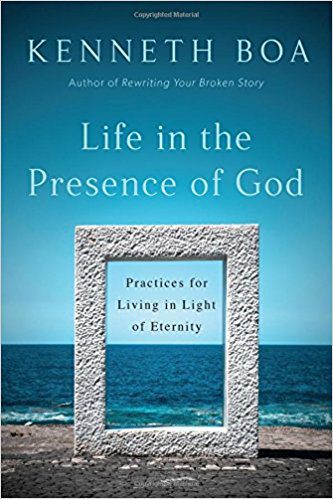Today I interview Kenneth Boa, the author of the superb new book, Life in the Presence of God.
It’s rare that I come across a kindred spirit in the area of knowing the Lord. But Ken is one of those rare souls.
I highly recommend his book, Life in the Presence of God.
The book is so good I added it to my 100 Best Christian Books List.
Anyways, here is Part 1 of my interview with Ken.
Enjoy!
Most people can describe what it feels like to sit in cold weather. They can also describe what it feels like to sit in a sauna. In the same way, how do you personally describe the experience of God’s presence? How do you describe the feeling, sense, or consciousness of God’s presence and how it differs from when you don’t feel, sense, or are conscious of His presence?
Ken Boa: St. Augustine and others throughout the years have tried to describe God’s presence and leading. It’s not easy to do. The things of God are accompanied by a peace rather than anxiety, a sense of proportionality and rightness. When something is not of him, there’s often a check in my spirit, something that doesn’t feel right about it. I can’t always put my finger on why, and sometimes it’s the right thing but the wrong timing. When this happens, you want to slow down and wait for God’s timing. The potential for self-deception, for imposing our own desires and agenda on God’s, is why it’s so important that we immerse ourselves in the divine milieu and train ourselves to recognize him. This takes years of training and learning how to discern, and we’ll all make mistakes at times—thinking something is from him that’s not, although you may not realize this is the case until later.
Out of all the recommendations you’ve given in your book about how to experience God’s presence, which two or three are the most effective for you personally right now?
Ken Boa: I’ve been inviting the Holy Spirit to guide my thinking and asking for God’s direction in my prayers, which is one of the prayer exercises in the companion training guide to the book. This entails entering my prayer time without a predetermined agenda, but, rather, seeking to attune myself to his agenda. When I ask God to put people in my mind to pray for, I’ve discovered there’s often a corresponding reality confirming that the prompting was from him. For instance, one gentleman who recently popped in mind and who I hadn’t thought about in a long while, I contacted with a word of encouragement. He wrote back with a message that was not only a blessing to me, but clearly indicated that God had brought him to mind, at that time, for a reason.
The other exercise I’ve been practicing is the kairos versus chronos one. This is about seeing time from God’s point of view and not only according to our usual human point of view of “clock time” (chronos). For example, rather than seeing the interruptions in my day as that—things that side track me from what I am really supposed to be doing—instead, seeing them as my ministry, and intentionally inviting him into those divinely ordained moments. Like so many of the exercises in the book, this one is about intentionality. It’s not one more thing to add to the to-do list, but a new approach to what’s already happening in your life.
Important question – this is very common, I’ve discovered: What do you say to the person who has spent years practicing God’s presence, but “feels” and “senses” absolutely nothing while doing it? They don’t have the kind of palpable sense or delightful feeling that many of the mystics say is available to those who seek God. They certainly can’t describe it as being “heaven on earth” as some have put it. Note that these people aren’t practicing any kind of sin. They’ve been faithful to the Lord and as well as to the practice of His presence.
Ken Boa: We should be aware of the emotional side, but emotions shouldn’t rule. They are best seen as diagnostic tools that can reveal good or bad thinking, rather than sole sources of truth. Some of us are more on the thinking side on the Myers-Briggs spectrum, while others are more on the sensing and feeling side. We all have seasons of aridity, so while we should not ignore our feelings, we shouldn’t rely on them to tell us the truth. This is why training is important; it’s about developing muscle memory—a skill in thinking and responding rightly—much as an athlete, through practice and habituation, becomes increasingly adept and fluid in complex actions. No matter how we feel on a given day, if we show up consistently, God will transform us over time, though the changes may be imperceptible at first.
By the same token, even when we “feel” God’s presence, there’s always the danger of self-deception, of imposing one’s own agenda, no matter how far along you are in your faith journey. That’s why we need other sources for discerning his voice and will. Always look for external corroboration for an internal sense. When I teach about discerning God’s will, I teach it as a way of life rather than as an emergency support system for a single event in time. It’s about training ourselves to recognize him in the everyday. I counsel believers, especially new ones, to first do a “Word check” (through the Bible and prayer) and then an authority check (what do other people, wise counselors who root their advice in biblical truth, think about this decision?). This creates a feedback loop, and the wise person will review and evaluate decisions after making them so as not to repeat the same mistakes.
Tom has been a believer for many years. He is completely committed to Jesus, and he has been seeking God’s presence for a long time. But he’s never had a “sense” or “consciousness” of God’s presence or the “joy” that is supposed to go along with it. Tom has a friend named Bill who is a successful entrepreneur. Beyond being successful, Bill always seems happy and content. In fact, Bill is happier and more content with life than Tom appears to be, and Tom has admitted this himself.
Bill is not a Christian and he doesn’t see a need for Christ in his life. Like many non-Christian entrepreneurs today, Bill meditates in the mornings (which is strikingly similar to how Christians meditate). Bill claims this morning practice gives him insight into his business.
Tom’s question is, “Other than sharing the judgement to come and the hope of eternal life after death with Bill, what can I offer Bill when it comes to Jesus and the gospel?”
How would you answer Tom?
Ken Boa: While Bill’s behavior may outwardly look similar to Tom’s, Christian meditation is different because it involves the engagement of a personal being outside of ourselves. It involves more than my own cognition. It engages a real, personal Presence, through whom we experience a love that surpasses our own knowledge and comprehension. Unlike a mantra uttered over and over, the name of Jesus has power. (That power comes not from the word, but from the One to whom that name corresponds.) Tom and those like him are onto something, but they’re missing the personal dynamic that imparts true meaning to our lives. A personality can do things that energies and forces can’t (e.g., love, comfort, and guide us). It’s far more interesting to pursue this One who surpasses our own understanding.The benefit of Tom’s meditation may be real, but it stops there; it’s limited. The higher can account for the lower, but the lower can’t account for the higher things we encounter, such as beauty, love, and personality. So Tom and friends are missing out on something far better and richer that begins now and lasts beyond this lifetime.
Since the release of your book, describe two or three of the most helpful spiritual practices you’ve built into your life that help you to be in God’s presence. Give concrete examples of how you practice them.
Ken Boa: There are many. I named a couple earlier, but here are a few more:
- Summoning up Scripture verses more frequently as I go about my day’s activities. For instance, I’ve been going over Colossians 3:1–17 during “dead time” (like driving) so that I am filling that time with intentional thoughts. Meditating on this passage, I noticed how, at the end, Paul emphasizes a mindset of gratitude three times. This passage has helped me to be thankful to God at times when I’d otherwise be tempted to grumble, complain, or worry.
- Also while driving, now that the leaves are gone, I’ve been noticing the architecture of trees along the road. I never used to notice these things, but now I marvel at the various ways trees are elegantly designed to sustain the canopy of leaves to come in spring. There are some good spiritual metaphors in nature that can call us into wonder and praise for God’s creative work.
- I have been praying more for strangers, sometimes using one of Paul’s four life-changing prayers. (These are found in Ephesians 1:17–19a; Ephesians 3:16–19; Philippians 1:9–11; and Colossians 1:9b–12.)
- I’ve done time-stopping exercises with groups, encouraging those present to take a mental picture, saying, “Let’s remember this moment together.” This can be a moment of inviting God’s presence into our time, of thanking and remembering him, because we practice his presence not only as individuals but also corporately. I did this at one memorable dinner with a group of men with whom I get together frequently, and I’ve done it in other contexts as well.
What do you say to those who strongly object to anything mystical, saying that things like silence, contemplation, meditation, centering, etc. are part of the Eastern cults and not Christianity?
Ken Boa: There’s a “mystical” communion into which we’re invited with God that we’ll enjoy fully when we pass over from death to life. This concept is wholly biblical. However, ultimate reality is not the cosmos or a mysterious force but an infinite and loving Person. Contemplation, meditation, and centering are all means of connecting with him, never ends in themselves. Our faith is only as good as the object in which it’s placed. Devotion to a false god is a dead end—or worse. Meditation is good if it’s focused on the one true God. These practices are frequently in the Bible, and Jesus himself practiced them; he was the ultimate contemplative in action! Everything he did and said was fueled by his relationship with his Father. Nothing he did was outside of his Father’s will, but only because he took the time to discern that will and discuss his decisions with his Father. The very point of my book Life in the Presence of God is that these practices can become integrated as a part of our daily activities; they’re for everyone and not only for monks and mystics. We need times of solitude, but we also need to bring what is learned in quiet into our “noisy times.” This is what it means to abide in Christ. Abiding is an ongoing activity to which all Christians are called; it’s the essence of the Christian life, or what Watchman Nee called the “normal Christian life.”














